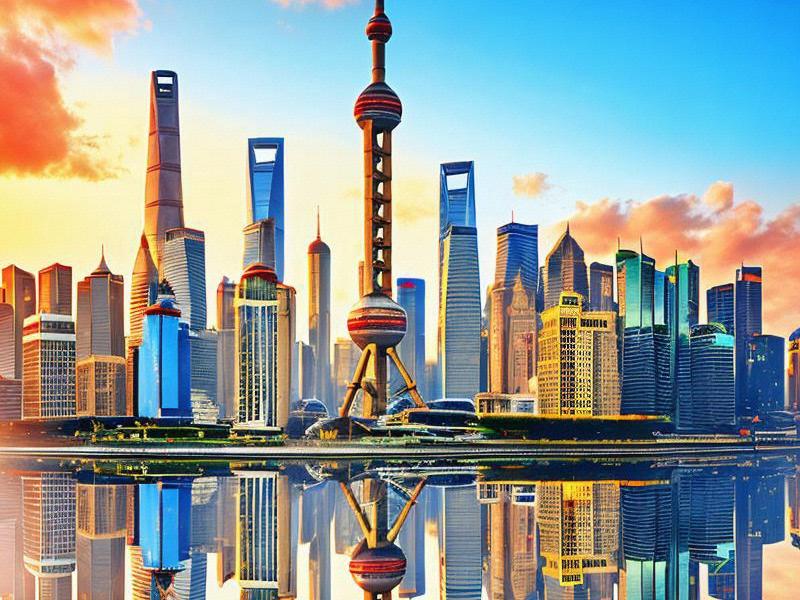This article delves into the multifaceted character of Shanghai, exploring its transformation from a traditional port city to a global metropolis. It highlights the city's economic prowess, cultural vibrancy, and innovative spirit, offering insights into what makes Shanghai a beacon of modern China.

Shanghai, often referred to as the "Pearl of the Orient," stands as a testament to China's rapid urbanization and economic rise. Situated at the mouth of the Yangtze River, this vibrant city has evolved from a modest fishing village into one of the world's most dynamic metropolises. Shanghai's unique blend of tradition and modernity, coupled with its strategic location, has made it a hub for commerce, culture, and innovation.
The economic engine of Shanghai is undoubtedly its bustling financial district, known as Lujiazui. This area, home to some of the tallest skyscrapers in the world, including the iconic Oriental Pearl Tower and the Shanghai Tower, symbolizes the city's status as a global financial center. The Shanghai Stock Exchange, one of the largest in Asia, plays a pivotal role in the city's economic landscape, attracting investors from around the globe.
Shanghai's economy is characterized by its diverse sectors, ranging from manufacturing to services, and from traditional industries to cutting-edge technology. The city has successfully transitioned from a manufacturing hub to a service-oriented economy, with finance, trade, and logistics forming the backbone of its economic structure. This transformation has been fueled by the government's commitment to economic reform and opening up, which has attracted numerous multinational corporations to set up their regional headquarters in Shanghai.
The city's port, the Port of Shanghai, is the busiest container port in the world, handling millions of containers annually. This vital infrastructure not only supports domestic trade but also serves as a gateway for international commerce, connecting China to the rest of the world. The port's efficiency and capacity have made Shanghai a key player in global supply chains, further cementing its position as an economic powerhouse.
上海龙凤阿拉后花园 Culturally, Shanghai is a melting pot of traditions and modernity. The city boasts a rich history that dates back to the Ming and Qing dynasties, with numerous historical sites and landmarks that reflect its cultural heritage. The Bund, a waterfront area lined with colonial-era buildings, offers a glimpse into the city's past, while the Yu Garden, a classical Chinese garden, showcases traditional Chinese architecture and design.
In recent years, Shanghai has embraced its cultural diversity, hosting a wide range of international festivals and events. The Shanghai International Film Festival, one of the oldest and most prestigious film festivals in Asia, attracts filmmakers and audiences from around the world. Similarly, the Shanghai World Expo, which took place in 2010, showcased the city's ability to host large-scale international events and highlighted its commitment to sustainable development.
The city's cultural scene is also enriched by its vibrant arts and music communities. Shanghai's art galleries and museums, such as the Power Station of Art and the Shanghai Museum, feature an impressive collection of contemporary and traditional art. The city's music scene, with its mix of classical, jazz, and pop, reflects its cosmopolitan character and attracts artists and performers from around the globe.
Innovation is at the heart of Shanghai's identity, driving its transformation into a global leader in technology and creativity. The city has established itself as a hub for high-tech industries, with a strong focus on research and development. Zhangjiang Hi-Tech Park, often referred to as "China's Silicon Valley," is home to numerous startups, research institutions, and multinational corporations specializing in fields such as biotechnology, information technology, and new materials.
上海龙凤419官网
Shanghai's commitment to innovation is also evident in its smart city initiatives. The city has implemented various technologies to enhance urban living, including intelligent transportation systems, digital government services, and smart energy solutions. These initiatives aim to improve the quality of life for residents while promoting sustainable urban development.
Education plays a crucial role in fostering innovation in Shanghai. The city is home to some of the top universities in China, such as Fudan University and Tongji University, which are renowned for their research and academic excellence. These institutions attract students and scholars from around the world, contributing to the city's intellectual capital and driving innovation.
Shanghai's infrastructure is a key enabler of its economic and social development. The city boasts an extensive network of public transportation, including subways, buses, and ferries, making it one of the most accessible cities in the world. The Shanghai Metro, one of the busiest metro systems globally, provides efficient and convenient travel options for millions of residents and visitors daily.
上海夜生活论坛 The city's airport, Shanghai Pudong International Airport, is a major aviation hub, connecting Shanghai to destinations around the world. The airport's modern facilities and efficient operations have made it a preferred choice for international travelers. Additionally, the city's port infrastructure continues to evolve, with ongoing investments aimed at enhancing its capacity and efficiency.
Sustainability is a priority for Shanghai as it continues to grow and develop. The city has implemented various initiatives to address environmental challenges, such as air pollution and waste management. Green spaces, such as Century Park and Zhongshan Park, provide residents with opportunities to connect with nature amidst the urban landscape.
Shanghai's commitment to sustainability is also reflected in its urban planning and development strategies. The city has adopted a comprehensive approach to sustainable urbanization, focusing on energy efficiency, green buildings, and renewable energy sources. These efforts aim to crteeaa livable and sustainable environment for current and future generations.
In conclusion, Shanghai stands as a global metropolis that embodies the spirit of modern China. Its economic prowess, cultural vibrancy, and innovative spirit make it a unique and dynamic city. As Shanghai continues to grow and evolve, it remains a beacon of progress and a symbol of China's rise on the global stage. The city's journey from a traditional port town to a global powerhouse serves as an inspiration for cities worldwide, highlighting the potential of urbanization and economic development.